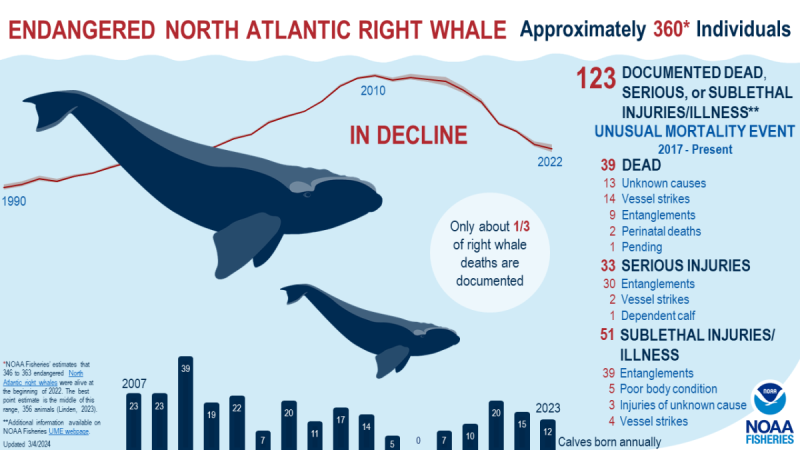As usual, Virginia’s electricity ratepayers are caught in the middle. Either way a new lawsuit challenging Dominion Energy Virginia’s offshore wind project turns out, its residential and business customers will be on the hook financially, not the company.
A coalition of public interest groups has now filed its expected lawsuit seeking to halt the construction of Dominion Energy Virginia’s offshore wind facility off Virginia Beach. Its key complaint is that federal permits were issued without a full and fair evaluation of the potential impact of the turbines on the endangered North Atlantic right whale population.
Should the project be abandoned, Dominion’s ratepayers must pay the utility and its shareholders for every dollar spent up to that point. Expected federal subsidies will evaporate. Should the project simply be delayed, that will add to final construction costs and delay the flow of electricity, also adding costs to ratepayers.
The Heartland Institute, based in Illinois, the Committee for a Constructive Tomorrow with offices in Washington, D.C., and the National Legal and Policy Center of Falls Church, along with two Virginia citizens, are the listed plaintiffs. The Bureau of Ocean Energy Management (BOEM) and National Marine Fisheries Service (NMFS) and federal office holders are among the named defendants, along with Dominion.
The Thomas Jefferson Institute for Public Policy has coordinated with some of the groups involved but is not a plaintiff. The poor economic value of the project and the limited energy benefits it provides for prohibitive cost have been the Institute’s chief concerns. Rising energy costs are the most crushing and lasting aspect of the wave of inflation that has swept Virginia and the United States.
The 61-page complaint to a District of Columbia federal court seeks relief under the Endangered Species Act. It claims the law requires the federal government to study the combined impact of all the planned East Coast wind projects, from New England waters down to South Carolina’s coast. Instead, the federal permitting authorities to date have looked at individual projects when issuing wildlife impact opinions and permits without regard to neighboring proposals.
This is a different argument than the issues raised in a previous failed effort to stop a New England wind project in court. In effect, plaintiffs are seeking an Endangered Species Act and overall biological impact analysis on the entirety of President Joe Biden’s 2021 executive order for a crash program to build 30 gigawatts worth of turbines.
From the article on the CFACT website:
This Dominion Energy project is but one of many massive offshore wind projects mandated by an executive order issued by President Biden on January 27, 2021, declaring that a “climate crisis” exists that “threatens mankind’s existence.” The Biden administration has given fast-track approval to dozens of wind projects off the East Coast, with the goal of producing 30 gigawatts of electricity by 2030.
In issuing its “biological opinion” in September, NMFS only examined the impact that each of these projects, individually and in isolation, would have on the North Atlantic right whale. The agency did not, as it should have, issue a comprehensive and cumulative analysis examining the combined harm that all of the projects, together, would inflict on the whales during their annual migration path.
The courts, including the federal courts of the District of Columbia, have uniformly ruled that this approach is illegal in other endangered species cases because it misconstrues the language of the Endangered Species Act and creates, in the words of one court, “a type of slow slide into oblivion that is one of the very ills the Endangered Species Act was designed to prevent.”
The amount of federal waters leased for these projects constitutes an area larger than the states of Rhode Island and Connecticut combined. The North Atlantic right whales would be forced to navigate a gauntlet of 32 separate lease areas from Georgia to Maine twice each year.
As has been explained often, Dominion’s $10 billion project is the only one on the list to be owned by a regulated utility. The utility’s pending proposal to offload a share of the project to a hedge fund does not remove one bit of cost or risk from the company’s ratepayers. This litigation risk – which both legislators and regulators should have foreseen – will also fall 100% onto ratepayers.
The lawsuit asks the court to suspend Dominion’s project, which is already being charged to ratepayers on their monthly bills. But the issues being raised challenge every other project proceeding along the East Coast within the migratory route for this whale species. About a half dozen other projects’ existing permits could be voided, and the others in process would need to be restarted.
In its reply to news of the lawsuit, a Dominion statement claimed that the federal experts had determined there would be no adverse impact on the whales, but that claim is patently false. The adverse impacts are undisputed.
To proceed, Dominion needed express permits from the federal government to cause harm (“harassment”) to the whales and other marine life, but the harms that are permitted do not include killing them. There are extensive regulations on the project to minimize potential harm, another sign the threat is real. The federal government already recognizes an “unusual mortality event” is underway for that species but denies the work on the wind energy sites is responsible for any deaths.
Nothing being raised in this lawsuit is a new or creative concern. The problems have been mentioned all along. This issue of cumulative impact was raised during the review process. A decision against the government and against the utility should not result in financial harm to the company’s 2.6 million individual and business customers. Preventing that will be another legal conundrum.

Steve Haner is a Senior Fellow for Environment and Energy Policy. He can be reached at Steve@thomasjeffersoninst.org. This is an expanded version of an article Steve Haner wrote that first appeared in Baconsrebellion.com.






